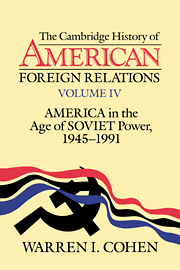Book contents
- Frontmatter
- Prelude
- 1 At war’s end: visions of a new world order
- 2 Origins of the Cold War
- 3 The Korean War and its consequences
- 4 New leaders and new arenas in the Cold War
- 5 Crisis resolution
- 6 America’s longest war
- 7 The rise and fall of Détente
- 8 In God’s country
- Conclusion: America and the world, 1945–1991
- Bibliographic essay
- Index
- THE CAMBRIDGE HISTORY OF AMERICAN FOREIGN RELATIONS
- References
7 - The rise and fall of Détente
Published online by Cambridge University Press: 28 March 2008
- Frontmatter
- Prelude
- 1 At war’s end: visions of a new world order
- 2 Origins of the Cold War
- 3 The Korean War and its consequences
- 4 New leaders and new arenas in the Cold War
- 5 Crisis resolution
- 6 America’s longest war
- 7 The rise and fall of Détente
- 8 In God’s country
- Conclusion: America and the world, 1945–1991
- Bibliographic essay
- Index
- THE CAMBRIDGE HISTORY OF AMERICAN FOREIGN RELATIONS
- References
Summary
In 1969, when Richard Nixon, Cold Warrior personified, entered the White House, it was clear that most Americans had had their fill of war and confrontation. The country was eager to end the wasting of American lives abroad, no longer persuaded that a hostile world would deny Americans their freedom if they stopped spending billions to support the appetite of the military-industrial complex. The endless war in Vietnam had changed American attitudes, led the people to question the wisdom of their leaders, eroded support for overseas military adventure. The United States had to disengage from the Vietnamese conflict. Perhaps the time to end the Cold War had arrived as well. No one was quicker to perceive the new public mood than Richard Nixon. No one was better able to free the country from the tyranny of hysterical anticommunism than the man who had contributed so much to fanning that hysteria. As one Washington wit remarked, he was the first president since the end of World War II who did not have to guard his flanks against attack by Richard Nixon.
Nixon and his national security adviser Henry Kissinger, like all postwar American leaders, sought a stable world order in which American interests would be preserved. Like their predecessors, they considered the containment of Soviet influence central to that end. But they confronted a Soviet Union that had gained strategic parity with the United States and whose leaders believed their country to be on the verge of becoming the world’s preeminent power.
- Type
- Chapter
- Information
- The Cambridge History of American Foreign Relations , pp. 182 - 218Publisher: Cambridge University PressPrint publication year: 1993



